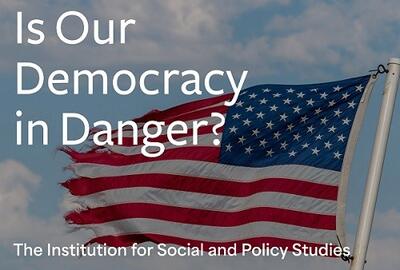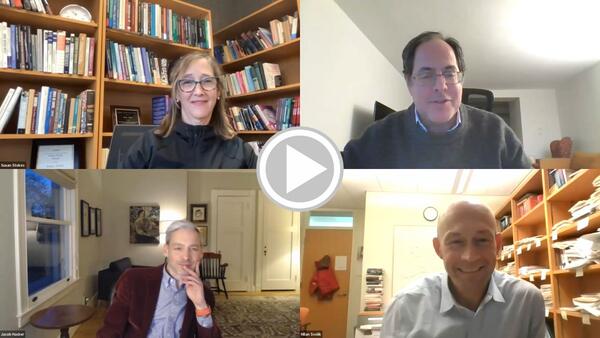Democracy in Danger: Yale Panel Discusses Causes and Consequences
Some argue that the 2024 presidential election holds stark consequences for American democracy.
But the current dangers to democracy do not generate from a single man or culminate in a single election. Or even exist in a single country.
Last week, Yale’s Institution for Social and Policy Studies assembled a panel of experts to analyze the latest research on democratic erosion, offering answers for how we arrived at this moment and guidance for how to navigate the dangers ahead.
“What’s happened to our democracy can be summed up by saying that a set of polarizing and inegalitarian changes in our political economy have altered the way our political institutions work,” said ISPS faculty fellow Jacob Hacker, Stanley B. Resor Professor of Political Science. “Or, as the case may be, don’t work.”
Hacker joined an online panel with Susan Stokes, Tiffany and Margaret Black Distinguished Service Professor at the University of Chicago; and Milan Svolik, ISPS faculty fellow and professor of political science at Yale. ISPS Director and Sterling Professor of Political Science Alan Gerber moderated the discussion.
“As a nonpartisan institution, ISPS is dedicated to conducting research into our society and deploying that knowledge to improve policies and practices for the benefit of everyone,” Gerber said. “In considering the state of the country and the performance of our political institutions, we are grateful for the insights shared by our panelists and so many of their colleagues. Research that aims to preserve and strengthen our democracy is both important and timely.”
Hacker said the country’s political institutions were well suited to help the United States become a global economic superpower in an era of manufacturing primacy and to lead in a transition toward a modern knowledge-based economy in recent decades. However, he said those same institutions have proven less adept at dealing with the strains and dislocations that emerged from the transition, fueling what he called a “backlash coalition” centered within the contemporary Republican Party and including both voters dissatisfied with the country’s economic and demographic changes as well as key segments of the American economic elite.
Hacker discussed the prominent role of right-wing media in shaping and intensifying the backlash, which has been concentrated in non-metropolitan areas that are overrepresented in Congress. In addition, he said that this structural deficit empowers the political minority and leads to gridlock, impeding efforts to update policies and deal with the strains created by the transforming economy.
“This backlash coalition has exploited core features of our institutions in ways that accentuate, rather than reduce, the threat to shared prosperity and a vibrant democracy,” he said. “Creating a vicious cycle rather a virtuous one.”
Stokes defined democratic erosion or backsliding as a significant decline along two dimensions: 1) the ability of the coequal legislative and judicial branches of government to monitor and influence the executive branch and 2) a decline in the ability of voters to be well informed and use elections as a mechanism for selecting leaders of their choice.
“So, despite the fact that in 2020 Donald Trump was defeated, American democracy remains fragile,” Stokes said. “And that isn’t just because a seemingly more anti-democratic version of the former president is poised to become the GOP’s presidential candidate. It’s also because the structural causes of erosion have not disappeared, and they have had enduring effects.”
She placed America’s democratic backsliding in the context of a broader wave of international threats to democracy in which leaders resemble right-wing ethnonationalists such as Trump and Hungary’s Viktor Orbán or left-wing populists such as Andrés Manuel López Obrador in Mexico and Jacob Zuma in South Africa.
Stokes said that as wealthy countries shifted away from manufacturing economies, parties on the traditional left of the political spectrum, such as the Democratic Party in the United States, shifted more toward globalist — and somewhat less redistributive — policy stances. This diluted their brand as parties of the working class and created an opening for ethno-nationalist parties on the right to gain traction.
Why do some countries experience democratic erosion while others do not? Income inequality, Stokes said.
“As countries become more unequal, the probability of erosion becomes stronger,” she said, noting that polarized incomes are associated with polarized politics, nurturing a general skepticism about democracy that empowers backsliding leaders who in turn encourage it. “We call this public mood institutional nihilism, which you can see in response to survey questions asking if someone agrees that we cannot fix the problems in our political institutions and need to tear them down and start over.”
Stokes showed a graph depicting that in countries with high income inequality, such as South Africa and Botswana, the probability of democratic erosion has risen to about 30 percent, while in countries with less income inequality, such as countries in Northern Europe, probability hovers in the low single digits. Stokes and her colleagues calculate that the United States has a 9% annual risk for backsliding, based on U.S. economic data from 2017.
“Which isn’t a very big number,” she said. “But it’s a terrifyingly big number.”
Milan Svolik discussed the extent to which Americans are willing to prioritize democratic principles when they conflict with partisan interests, as explored in a series of studies he conducted with Matthew Graham, a former ISPS graduate fellow and current assistant professor of political science at Temple University. They found that Americans are willing to make tradeoffs regarding democracy out of partisan loyalty or to achieve specific policy objectives.
Svolik said that this tendency represents a significant threat to American democracy because of how states set their own rules for the conduct of elections, creating opportunities for the party that controls the state to tweak the rules to their advantage — as with voting restrictions and extremely gerrymandered voting districts — typically with little attention or opposition from voters.
“Such subnational authority to shape the conduct of elections is unique around the world,” he said. “And it simply creates institutional opportunities to tilt the playing field in one’s favor.”
In addition, Svolik said that after Trump’s attempt to overturn the 2020 presidential election, Republican study subjects in 2022 were notable in their willingness to tolerate or even reward real-world candidates who questioned the fairness or denied the outcome of an election, a change from when he had conducted the experiment two years earlier. Voters on both sides also appear to be increasingly willing to justify their party’s undemocratic behavior by pointing to the other side’s undemocratic behavior, he said, citing recent efforts by both parties to create gerrymandered congressional districts.
“There is a tit-for-tat emerging where one side is saying we have to play dirty because the other side is already doing it,” Svolik said. “And this is occurring with little electoral cost on either side of the political spectrum.”
Stokes credited President Joe Biden for prioritizing calls to protect democracy in his speeches. And she noted recent successes by organized labor to win concessions from management and help close the wide income inequality gap.
Because of the alignment of corporations and business leaders with the rightward trajectory of the Republican Party, Hacker expressed skepticism that business interests would serve the same moderating role in our politics as it has in the past and help reduce the threat of democratic backsliding. Instead, he said voters need to organize to pressure for electoral and economic reform.
“In the short term, I am very worried, but I have optimism about the long term if we act now,” Hacker said, noting the growing recognition of the challenges and the efforts such as ISPS’s Democratic Innovations program to promote experimentation to improve the performance of governance.
And he said that recent elections have shown that voters organize and engage when faced with threats to their rights and democracy, often rejecting candidates who deny the reality of election outcomes.
“So, I think that’s the hope — you get that virtuous cycle going again,” he said. “And I believe over the long term, we can.”
